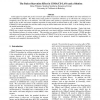6 search results - page 1 / 2 » Using Time Skewing to Eliminate Idle Time due to Memory Band... |
IPPS
2000
IEEE
13 years 9 months ago
2000
IEEE
Time skewing is a compile-time optimization that can provide arbitrarily high cache hit rates for a class of iterative calculations, given a sufficient number of time steps and s...
INFOCOM
1998
IEEE
13 years 9 months ago
1998
IEEE
Memory bandwidth is frequently a limiting factor in the design of high-speed switches and routers. In this paper, we introduce a buffering scheme called ping-pong buffering, that ...
LCN
1994
IEEE
13 years 9 months ago
1994
IEEE
In this paper we explore the packet starvation effect (PSE) that occurs in Ethernet controllers due to the unfairness of the CSMA/CD algorithm. The PSE causes some packets to expe...
USENIX
1994
13 years 6 months ago
1994
TreadMarks is a distributed shared memory DSM system for standard Unix systems such as SunOS and Ultrix. This paper presents a performance evaluation of TreadMarks running on Ultr...
BROADNETS
2005
IEEE
13 years 10 months ago
2005
IEEE
— Lightweight protocols that are both bandwidth and power thrifty are desirable for sensor networks. In addition, for many sensor network applications, timeliness of data deliver...

